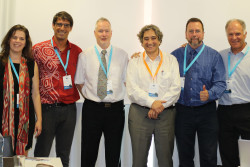Diving Deep to Explore New Frontiers of Collaboration and Innovation
The EU Horizon 2020 project ATLAS, along with sister projects SponGES, and MERCES, organised the session hosted by Prof Ricardo Serrão Santos, a Member of the European Parliament (MEP). The session reconfirmed commitment on international marine scientific research efforts, in both the North and South Atlantic. Presentations also noted efforts by regional fisheries management organisations to implement the United Nation’s General Assembly (UNGA) resolutions on managing high seas fisheries to protect and conserve deep-sea ecosystems and species. ATLAS partner Prof David Johnson, Seascape Consultants, emphasised, “We need to present science messages in a language that decision-makers can understand and use, and take into account different spatial and time scales. Working with relevant industries helps to focus messaging for policy implementation.” Participants of the session also discussed the need for more knowledge of deep-sea ecosystems and processes to better assess the potential and consequence of exploiting marine resources such as through deep-sea mining. Ensuring the conservation and sustainable use of the deep-sea in a changing climate will assist regulators in building resilience in these ecosystems. The “Blue Enlightenment” event (13-14 July 2017) celebrated the launch of a South Atlantic Flagship Initiative between the European Union (EU), Brazil and South Africa. The highlight of the event was the signing of “The Belém Statement on Atlantic Research and Innovation Cooperation”, which aims to deepen scientific knowledge of marine ecosystems, specifically the interrelations between oceans and climate change, food and energy systems, as well as the dynamics of the Atlantic Ocean and its interconnected Circulation Systems from Antarctica to the Arctic. ATLAS partner Matt Gianni, Gianni Consultancy, said, “Recognising the linkages between the North and South Atlantic, the strengthening of cooperation envisioned by the Belém Statement will help provide a better understanding of Atlantic wide dynamics and ecosystem processes. This will help to address challenges such as integrating basin-wide data with the understanding that any changes to ocean circulation patterns related to climate change in the South Atlantic will affect the North Atlantic and vice versa.” These issues are also currently being considered at the fourth meeting of the Preparatory Committee for ocean biodiversity beyond national jurisdiction established by the General Assembly of the United Nations (UNGA), taking place in New York from 10-21 July 2017. This UN meeting aims to finalise recommendations for a legally binding instrument on the “conservation and sustainable use of marine biological diversity of areas beyond national jurisdiction (ABNJ)” under the United Nations Convention on the Law of the Sea (UNCLOS). As a significant percentage of the North and South Atlantic is ABNJ, many of the efforts that were showcased in Lisbon can contribute to the knowledge base upon which regulation and management under the UNCLOS should be built. For example, recent work as part of ATLAS has shown that in 20-50 years most of the Area Based Management Tools (ABMTs), currently in place will be affected by climate change. More precise and detailed oceanographic data are needed to determine possible refugia and more research on adaptation and resilience is needed to predict ecosystem response times. Maritime spatial planning requires cooperation and coordination across multiple organisations and bodies and aims to achieve broad objectives and responses to cumulative impacts. Continued dialogue, cooperation and collaboration between projects like ATLAS, MERCES, SponGES and others, will greatly support this process. For further information on the ATLAS project, please visit the ATLAS website here: www.eu-atlas.org
Keywords
Marine Science, Blue Growth, H2020, Deep Sea Research, Research Collaboration, Atlantic Ocean Research
Countries
Austria, Belgium, Bulgaria, Cyprus, Czechia, Germany, Denmark, Estonia, Greece, Spain, Finland, France, Croatia, Hungary, Ireland, Italy, Lithuania, Luxembourg, Latvia, Malta, Netherlands, Poland, Portugal, Romania, Sweden, Slovenia, Slovakia, United Kingdom



